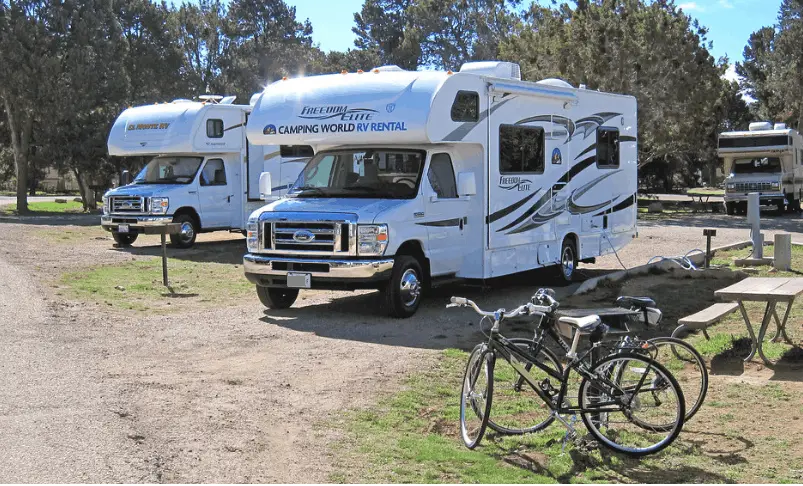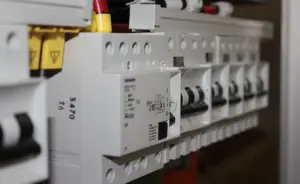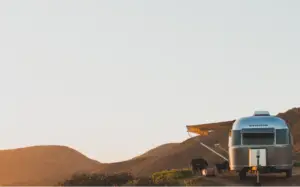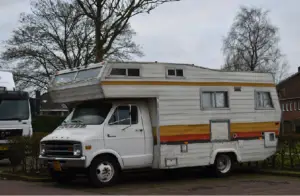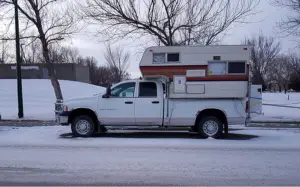Are you interested in knowing how travel trailer electrical system works? Well, then in this post i am hopefully going to be able to provide you with answers to some of the most-pressing questions. Lets try to understand RV electrical schematic, designs and common issues and solutions.
This way you should be able to get your travel trailer electrical system set up pretty well. Or At least have a good idea about what you should be doing and what you should be looking for which will make your life easier. This is a helpful RV wiring guide for dummies or beginners.
How do the electricals work in a travel trailer?
Honestly, the electrics inside of a travel trailer are not much different to your home. You will have a main ‘feed-in’ point for the electrics i.e. the initial power generator. You then connect this up to everything, and the juice will run through the travel trailer to the various lights and plug locations.
It is rather simple. The only difference between your home and the travel trailer is that you will have to connect the travel trailer up to that initial power supply on your own.
Basics of electrical components in an RV
Honestly, when it comes to the electrical components in an RV, you don’t really need to remember all that much.What you do need to know is that there are two different power systems in your RV.
You will have the 110-Volt system that will power all of those appliances, and then you have the 12-volt system.
The purpose of the 12-volt system is to keep the digital instruments in your RV running, just like a standard car. There is no overlap between the systems. The 110-volt system will run off a generator or shore power supply, while the 12-volt will be run off of a standard battery, just like a normal car.
It is imperative to think about the amount of wattage the 110-volt system will draw at once. This will ensure that you are able to feed the right amount of power into the RV. In fact, most of the things you need to think about when it comes to how travel trailer electrical system works will be related to wattage.
You don’t need to know much beyond that, as the bulk of the wiring will be done for you. In the vast majority of cases, you just need to plug in the cable that connects from the power supply to your travel trailer, and you are good.
Inverter and Converter : The only other components you will need to know about will be the inverter and converter. It is the former you will encounter the most, as it is the inverter which will convert DC current to AC. It is rare that you will need to convert AC to DC, but that is what the converter will do for you.
How does an RV or Travel Trailer Get Power?
Power for an RV or travel trailer doesn’t just come out of nowhere. You will need to have that initial power supply feeding into the system. We will look at the various power supplies in a short while. This power supply will be connected by via a heavy-duty cable. It is really a quick and easy process, and if you do it once, then you are always going to remember how to do it.
Different power sources used in a Travel Trailer
When it comes to power sources for a travel trailer, you have a few different options. If you are staying on a campsite, which most people will be, then you will be able to pay a little extra to have an electrical hookup that you can use.
Campsite Shore power : There may be fees for the amount of power that you consume. This is, essentially, like being wired into the ‘mains’ supply of a household. The power comes from the hookup and is fed directly into your travel trailer. It is a really simple method. You don’t need to think much beyond connecting up a wire and letting the system do the work for you.
Generator : If you are planning to be out on the road a bit, then it is likely that you will want to invest in a generator of some description. The generator can be loaded with fuel (normally gasoline or diesel) and it is switched on.
The fuel is burned, which in turn causes a reaction that generates electricity. It is basically like a mini-power plant. Generators can be heavy. But they work, and they can provide you with predictable power no matter where you are located.
Solar : The other option is to invest in some solar panels. The solar panels will charge a battery, which, in turn, will provide power to the rest of the travel trailer. These systems can be expensive. They can save money in the long run as you won’t need to worry about filling the system up with fuel.
It also means that you do not have to pay extra fees when staying on a campsite. Obviously, the solar panels can be used no matter where you are. This means that it may be one of the better options when you are out there on the road.
Battery : A DC 12 V battery can be source of power for your travel trailer. It can howevere may not able to run most of your electrical or elctronics items. But, its a necessary source of power to run smaller appliances.
30 amp vs 50 amp hookup in RV
There will be two types of electrical hookup for your RV. You will have either 30-amp or 50-amp. There are a few differences to them. For example:
The 30-amp will look much like a standard plug. There are three different prongs. One of these is neutral, one is ground, and the other is 110-volt live. The 50-amp will have four prongs. There are a neutral and a ground wire. There will be two 110-volt live wires.
Watts : The maximum number of watts that a 30-amp hookup can deal with is 3,600 watts. It can’t deal with anything more as it simply can’t pump out the power that is needed. Alternatively, the 50-amp will be able to provide 12,000 watts.
As you can probably guess; the 30-amp electrical hookup is going to be better for those RVs that have lower power consumption requirements. While the 50-amp will be more ideal for those larger appliances. You may or may not have both options available to you in your RV and on the campsites that you visit.
How much power or electricity do I need for my travel trailer
How much power you will need in your travel trailer will be completely dependent on what you are actually planning to power within your travel trailer. Perhaps your best bet will be to go through your travel trailer and add up the wattage of everything inside.
This should give you a rough overview of your power requirements. You will then want to add a small amount on top of this. This is because when you turn on an appliance or other electrical item on, it will require a slightly higher power load, just to boot it up. It will then reset.
If you don’t want to stagger turning on the appliances wired up to your trailer electrical system, then this is something that you are going to need to bear in mind.
Do bear in mind that the higher your power requirements, the heavier the generator you will need if you are bringing one along with you. Most people will not have every single appliance running in their trailer at once, so you probably do not need to go overboard with power. No sense buying a 5000 Watt generator if you are planning to only ever use 2000 Watts at once, right?
How does a converter work in a camper?
It is rare that you will need to use a converter in a camper, although they are useful to have, particularly if you are using a lot of smaller electrical items. This is because these smaller electrical items require DC power, and most hookups will be AC.
You will need a way to convert this AC current into DC current, or you run the risk of damaging your small electrical items e.g. phones, and some of the netbook-style laptops.
The reason why they tend not to see as much use as an inverter is the fact that most electrical items come complete with a charger that does basically the same job anyway. So, a converter is always useful to have, but it isn’t going to be 100% necessary.
Common travel trailer electrical problems and their troubleshooting
There are several issues which can be resolved by yourself should they occur in your travel trailer. Perhaps the simplest problem is the blowing of a fuse. Incidentally, most people don’t ever seem to realize that the power not turn on at all (or randomly turning off never to go back on again) is down to a blown fuse. Always carry a stash with you. This way you always have something to hand to replace the fuse.
If you find that the power is going when you turn on certain appliances, then you may want to reduce the load on the power supply. It is likely that you will be drawing a lot more wattage than the system is set-up to handle.
Other issues may be down to wires that are not grounded touching metal. This can cause a short circuit, which can cause the power to go completely, or not enough power to be spread throughout the system. This is easy to diagnose. Unplug everything. Replace the cable that feeds the travel trailer.
This information should help you to resolve the vast majority of issues that may occur in a travel trailer.
Using solar in travel trailer
If you want to save as much money on power as possible, then you may want to look into a solar generator, or solar panels. Throughout the day (it doesn’t necessarily have to be very hot and sunny!), the solar panels will absorb the rays from the sun.
This does a bit of scientific wizardry, and will charge batteries as it does so. These batteries then provide the power to where you need it. So, basically, solar panels will be charging batteries to store energy.
Hooking up solar power to your travel trailer is as easy as any other type of electrical hookup. Just connect it up to the main electrical socket for your travel trailer and it will work, that is assuming that the batteries are charged. The initial charge on the batteries may take a little while.
Is Solar reliable option?
Do bear in mind that solar panels will not always provide reliable power. You are at the whim of the sun and your batteries, and they are not going to charge overnight. This means that you may need to be a little bit more conservative with your power. Particularly if days are pretty cloudy as the batteries may not get the full amount of juice that they need, which could have an impact on the amount of power you can produce. If you are in one of the sunnier climates, then solar energy is fantastic.
Yes, it will cost a little bit more to buy the panel initially. There is little that can go wrong, and you will essentially be generating ‘free’ energy, although you may want to have a backup just in case the solar panel is unable to deliver all of your energy needs.
The good thing is that any backup power supply you need doesn’t have to be too big. Just enough to keep the ‘must haves’ running, like your fridge and freezer.
Conclusion
Obviously, this is not everything that there is to know about how travel trailer electrical system works. But, I do hope that it gives you a decent idea, and points you in the right direction of what you need to get up and running with your power supply.
After all, one of the true joys of having a travel trailer is the fact that you do have the opportunity to have electrical items set up in it if you want. This guide will have hopefully given you a good start there.

